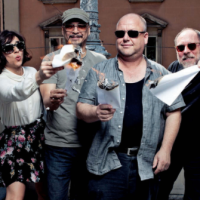
By Eleni P. Austin
If you came of age in the ‘70s, you might remember a classic deadpan bit from “Saturday Night Live.” In the Spring of 1976, producer Lorne Michaels rather seriously offered the Beatles a certified check for 3,000 if they would get back together and perform on the show. “Divide it any way you want. If you want to give Ringo less, that’s up to you.”
Ironically, John Lennon and Paul McCartney were actually together, watching SNL when Michaels made the offer. Of course, it never came to pass. The Beatles never officially reunited. It seemed like an impossible suggestion at the time. When a band broke up, they broke up for good. Not anymore.
Ever since the ‘90s, bands break up and reunite, like 10 minutes later! Sometimes, it even feels like a career move. A band is floundering, stage a break up and then wait a year or two and reform. Cynical but lucrative. Hopefully, that isn’t the case with the Pixies.
Back in the early ‘80s, Charles Thompson IV (ne’Black Francis) was attending University Of Massachusetts, in Amherst, as was Joey Santiago. They lived next to each other in a dorm suite, almost immediately they began playing guitar together.
After he completed a student exchange program in Puerto Rico, Francis dropped out of college. He and Santiago worked in a warehouse and woodshedded. Francis began writing songs on acoustic guitar and composing lyrics on the subway. He placed a classified ad for a bassist, wanting anyone who “liked Husker Du and Peter, Paul & Mary.”
After two weeks, Ohio native Kim Deal answered the ad. Suggesting they recruit her friend, David Lovering for drums, the Pixies were born in 1986.
They began playing clubs and bars in the Boston area. After recording a 17 track demo at the Fort Apache studio, their music came to the attention of Ivo Watts-Russell, founder of 4AD.
4AD was a British indie label that began in 1979. Their eclectic roster included Birthday Party, Cocteau Twins, Modern English and Throwing Muses. (They continue today with vanguard artists like Future Islands, The National and Tune-Yards).
Signing with 4AD in 1987, they immediately released an EP, Come On Pilgrim and followed up with their full-length debut, Surfer Rosa, produced by Steve Albini. Both were quickly embraced by critics in America and Great Britain. They also garnered airplay on college radio and MTV’s weekly alternative Rock program, “120 Minutes.”
Their sound was brash and vitriolic. Slashing guitars referenced noise rock, psychedelia and surf rock. Francis’ yowly vocals were offset by Deal’s sweet harmonies. By 1988, the band had jumped to a major label, Elektra, and hooked up with producer Gil Norton.
Their sophomore effort, Doolittle, arrived in early 1989. Boasting a clean, almost radio friendly sound, the album produced two super-catchy singles, “Here Comes Your Man”and “Monkey Gone To Heaven.”
Despite their newfound success, there was tension in the band. Deal’s compositions were getting the short shrift. Rather than disband, the Pixies took a hiatus. Black Francis booked a solo tour, Santiago and Lovering took vacations and Kim Deal formed her own band, the Breeders, and recorded their debut, Pod.
The band reconnected with Gil Norton, and their next two albums, Bossa Nova in 1990 and Trompe le Monde in 1991 continued the Pixies’ streak of excellence. Although they never achieved superstar success, the band was a seminal influence; a touchstone for artists like Kurt Cobain, Bono, PJ Harvey and even David Bowie who said “the Pixies made just about the most compelling music of the ‘80s.”
Sadly, the adulation wasn’t enough to keep the band together. They broke up in 1992, just as their most apt pupil, Kurt Cobain, achieved superstardom in Nirvana. He point-blank admitted that “on Smells Like Teen Spirit, I was basically trying to rip off the Pixies.”
Black Francis became Frank Black and began a prolific solo career. David Lovering became a magician (!) Joey Santiago and his wife formed a band, the Martinis. Kim Deal re-activated the Breeders and released Last Splash, one of the biggest sellers of 1993.
A decade later, the Pixies agreed to reunite. They played select dates in the U.S. as a warm-up for their 2004 appearance at Coachella. The reception was massive, it seemed as though the zeitgeist had finally caught up to the Pixies.
They continued to tour for the next nine years. But just as they were preparing to record, Kim Deal quit the band. Kim Shattuck, of the Muffs and Pandoras, replaced Deal for the European tour. Paz Lenchantin of Zwan and A Perfect Circle replaced Shattuck. But when the Pixies retreated to the studio, it was as a three-piece.
With Gil Norton handling production chores, the Pixies recorded 12 tracks, splitting them between three EPs, whimsically entitled EP 1, EP 2 and EP 3! Now the tracks have been re-configured into the full-length album, Indie Cindy.
The album opens with the skronky jabberwocky of “What Goes Boom.” The guitars pivot between kaleidoscopic and sludgey. Thrumming bass lines connect to a tick-tock beat. The lyrics are a pleasing string of non-sequiters… “I like that slinky little punky little bit funky itty bitty chunky right there.”
The Pixies truly pioneered the “loud quiet” dynamic that Nirvana popularized. Three tracks, “Greens And Blues,” “Ring The Bell” and “Snakes” are served up like Punk Rock comfort food. “Greens And Blues” feature guitar riffs that ricochet between jangly arpeggios and keening scales. The lyrics sketch a portrait of a diffident (possibly alien) suitor…“I’m not together and you know it’s true, my bits all wander in the trees/And if I seem a little strange would you excuse me please?”
“Ring The Bell” is shimmery pop perfection. Ringing guitar notes are anchored by propulsive rhythms. Black Francis’ usual peevish vocals have been supplanted by surprisingly honeyed tones. Of course this burst of enthusiasm is cloaked in cryptic language…”I’ve been away for a long time, and though I’ve had some good times I would have paid a crore to see the Garland once more.”
Finally, “Snakes” tethers a galloping beat to a series of guitar notes that cluster like Gordian knots. Here Francis is positively gleeful as he predicts impending, (possibly biblical) doom…”snakes are coming to our town/a plague for our mistakes.”
Two tracks, “Indie Cindy” and “Magdalena 318” blend the sweet-sour as only the Pixies can. On the former, Francis’ vocals ping-pong between a maniacal rant….”I’m the Burgermeister of purgatory/ You put the cock in cocktail”… with a wistful chorus full of courtship ritual….”I’m in love with your daughter, though she has no need.”
The latter blends hypnotic guitar riffs with a fluttery-stuttery backbeat. The lyrics offer a calibrated homage to Magdalena who is both the “meanest” and the “leanest.”
Other interesting tracks include the slightly soporific “Silver Snail,” the querulous “Bag Boy” which incorporates jagged guitar licks and roiling rhythms. On “Blue Eyed Hexe” fractious power chords collide with fluid bass lines and kinetic percussion.
Less successful is the Indie paint-by-numbers feel of “Another Toe In The Ocean” and the weirdly Italianate “Andro Queen” The album closes with “Jaime Bravo”, a possible tribute to Greg Brady’s “Johnny Bravo,” and a veritable potlatch of angular riff-age and soaring harmonies.
Despite the fact that the album is missing a key component of the Pixies’ sound, namely Kim Deal, the finished product is fairly cohesive. Ultimately, Indie Cindy is a worthy addition to the Pixies canon. But is that enough?












































